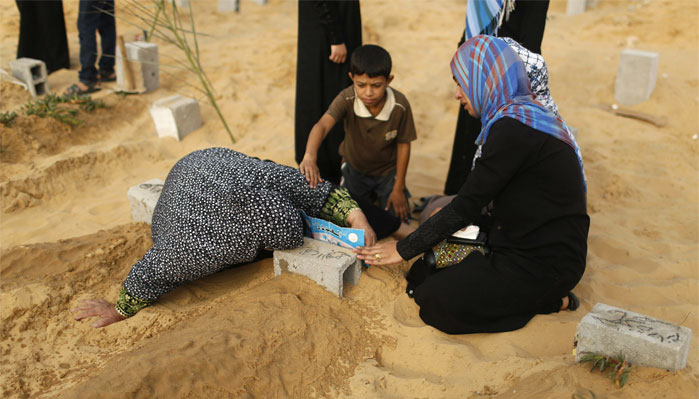A Palestinian woman cries at the grave of her son, who medics said was killed during the Israeli offensive, at a cemetery in Beit Lahiyah in the northern Gaza Strip
Reuters/Gaza
Israel eased its assaults in the Gaza Strip and Palestinian rocket fire from the enclave declined sharply on Monday, the military said, with both the United States and United Nations calling for a durable ceasefire.
As international pressure mounted to end a 21-day conflict in which more than 1,000 people have been killed, an Israeli military official said the army would only fire in response to attacks, adding that this would be for an "unlimited" period.
However, Israeli troops continued to hunt and destroy cross-border militant tunnels inside Gaza, and it was not clear if Hamas Islamists who control the small enclave were ready to agree to a prolonged pause.
Hamas said on Sunday it wanted a 24-hour truce to mark the Muslim holiday of Eid al-Fitr, which started on Monday. In the hours after its announcement, Gaza gradually fell quiet.
Just one rocket was fired out of the battered coastal territory at the Israeli city of Ashkelon in the first nine hours of Monday, the military said. Gaza residents reported brief bursts of tank shelling and no casualties.
"This ceasefire or abatement is dynamic on the ground. If we need to, we will respond," Israel's chief military spokesman, Brigadier General Motti Almoz, told local media.
U.S. President Barack Obama on Sunday urged Prime Minister Benjamin Netanyahu to hold fire unconditionally, while the U.N. Security Council agreed a statement that called on both sides to implement a humanitarian truce that stretched beyond Eid.
Tension between Netanyahu's government and Washington has flared over U.S. mediation efforts to end the three-week-old war, adding yet another chapter to the prickly relations between the Israeli leader and Obama.
U.S. Secretary of State John Kerry visited the region last week to try to stem the bloodshed, his contacts with Hamas - which Washington formally shuns - facilitated by Egypt, Turkey, Qatar and Western-backed Palestinian President Mahmoud Abbas.
Israel wants Egypt, which also borders the Gaza Strip and views Hamas as a security threat, to take the lead in curbing the Palestinian Islamists.
A flurry of media leaks by unnamed Israeli officials damning a draft agreement attributed to Kerry as too accommodating of Hamas was challenged by a U.S. official who, also anonymously, told reporters U.S. efforts had been mischaracterised.
Obama appeared to link Israel's core demand for Hamas to be stripped of cross-border rockets and infiltration tunnels, to a peace accord with the Palestinians that is nowhere on the diplomatic horizon.
Repeated U.S.-led negotiations over the past 20 years have failed to broker a permanent deal. The most recent round of talks collapsed in April, with Palestinians livid over Jewish settlement building in the occupied West Bank and Israelis furious that Abbas had signed a unity pact with old foe Hamas.

